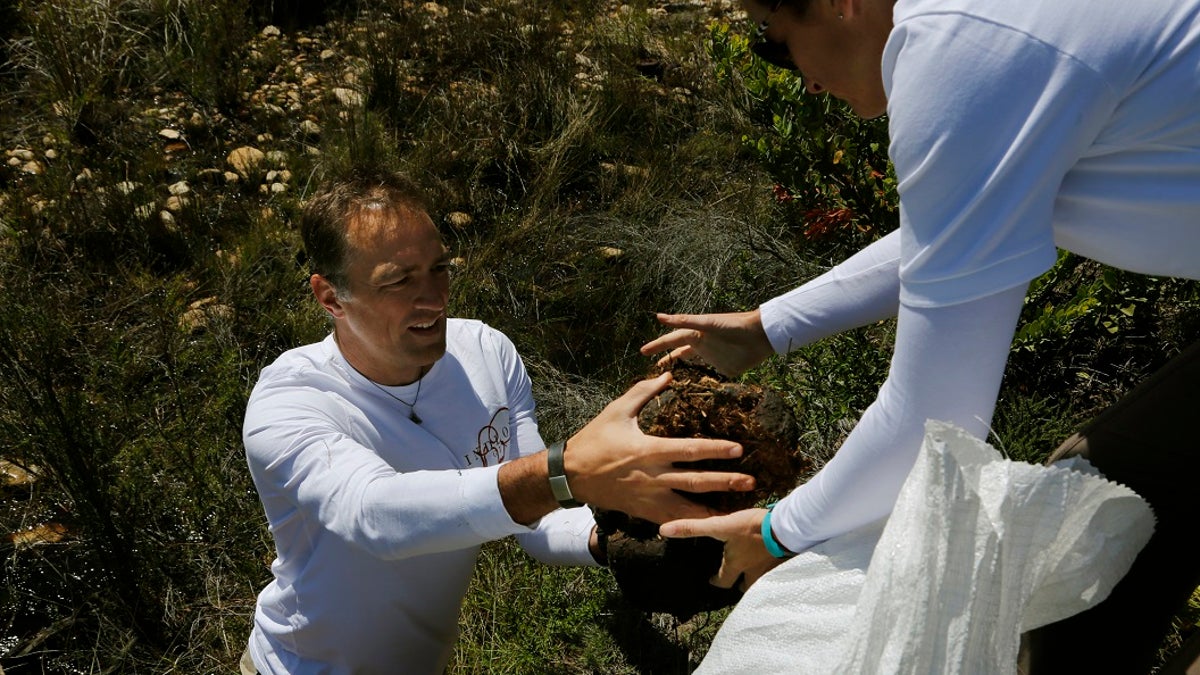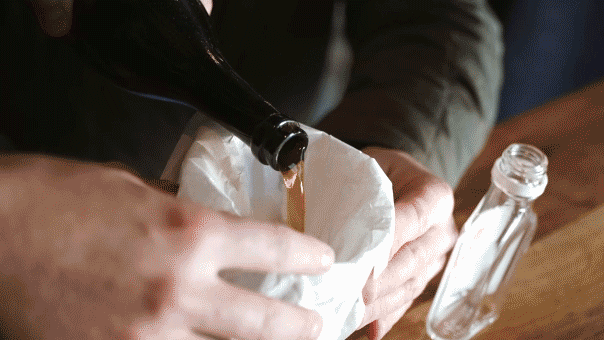Fox News Flash top headlines for Nov. 12
Fox News Flash top headlines for Nov. 12 are here. Check out what's clicking on Foxnews.com
A South African couple have created a gin infused with an unlikely ingredient. Brace yourselves.
It's elephant droppings.
Les and Paula Ansley, both scientists, got the idea to make their own special variety of gin after going on a safari a year ago.
A wildlife ranger explained to the couple, creators of Indlovu Gin, that elephants eat a variety of fruits and flowers and digest less than a third of it.
ANTI-PG&E BEER SPARKS BACKLASH AGAINST CALIFORNIA BREWERY

Les Ansley collects fresh elephant dung in the Botlierskop Private Game Reserve, near Mossel Bay, South Africa, Tuesday, Oct. 24. The makers of a South African gin infused with elephant dung swear their use of the animal’s excrement is no gimmick. The creators of Indlovu Gin, Les and Paula Ansley, stumbled across the idea a year ago after learning that elephants eat a variety of fruits and flowers and yet digest less than a third of it. (AP Photo/Denis Farrell)
"As a consequence, in the elephant dung, you get the most amazing variety of these botanicals," Les Ansley told The Associated Press.
He recalled his wife suggesting they make their own gin from the botanicals. They described the gin's flavor as "lovely, wooded, almost spicy, earthy" and one that changes with the seasons and location.

A sample of elephant dung is shown at a gin tasting session at the Botlierskop Private Game Reserve, near Mossel Bay, South Africa, Monday, Oct. 23. (AP Photo/Denis Farrell)
The couple collect the elephant waste themselves with their bare hands, "so you're able to compare almost different vintages of the gin," Les Ansley said. They initially had it mailed to them in the first stages of the gin-making process.
Five large bags of the dung are collected to make 3,000 to 4,000 bottles of the gin. The droppings are then dried, crumbled and washed to remove and dirt and sand. The smells left are that of flowers, fruits and leaves eaten by the elephants, Ansley said.

A gin tasting session is held at the Botlierskop Private Game Reserve, near Mossel Bay, South Africa, Monday, Oct. 23, 2019. After about five sizeable bags of dung are collected for a batch of 3,000 to 4,000 bottles of the gin, the droppings are dried and crumbled, then washed to remove dirt and sand. Eventually, only the remains of the fruits, flowers, leaves and bark eaten by the elephants are left behind. (AP Photo/Denis Farrell)
Each bottle sells for around $32 and is marked with the date and coordinates of where the elephant poop was collected. The couple did not say how many they've sold.
"The initial reaction of most people is, 'What? There's no way.' But most people are very keen to actually taste it," Ansley said.

A bottle of elephant dung infused Indlovu, which means elephant in the Zulu language, gin rests on bar at a tasting session at Botlierskop Private Game Reserve, near Mossel Bay, South Africa, Monday, Oct. 23, 2019. (AP Photo/Denis Farrell)
CLICK HERE TO GET THE FOX NEWS APP
The gin is sold online and at duty-free shops and game lodges. The name Indlovu means elephant in the Zulu language. Tourists looking for a unique African experience have been more than willing to give it a taste.
"I even touched the elephant dung, and being close to the animals are very majestic," said Elsabe Hannekom, a visitor to the Botlierskop Private Game Reserve in Mossel Bay, South Africa who participated in a tasting session. "So having a piece of them actually feels quite good. An export of the African experience, I would say."
The Associated Press contributed to this report.









































